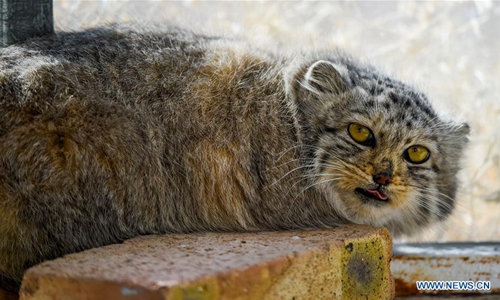Beijing passes regulations to ban indiscriminate consumption of wild animals
Source:Global Times Published: 2020/4/28 12:01:55

Photo taken on March 13, 2020 shows a manul rescued by Forest Public Security Bureau of Sunite Right Banner in Xilingol League, north China's Inner Mongolia Autonomous Region. In recent years, the Forest Public Security Bureau of Sunite Right Banner has strengthened its patrolling efforts and rescued many wild animals. (Xinhua/Wei Jingyu)
In order to better safeguard people's health and livelihoods, the city of Beijing has passed regulations banning the hunting and consumption of wild animals and their products, and violators will be severely punished. The ban will come into effect from June 1.
The Standing Committee of the People's Congress of Beijing, which is the legislature of the capital city, passed the regulations to better protect wild animals on Friday.
The hunting and killing of listed wild animals and consumption of wild animals and their products are banned. The regulations stipulate stiffer penalties for illegal hunting, eating, using, selling, transporting, carrying and delivering wildlife and its products.
Catering service providers such as restaurants, clubs and canteens are not allowed to purchase, store, or process wildlife and its products, which people are prohibited from eating.
Markets and e-commerce platforms are also prohibited from selling terrestrial wildlife, listed aquatic wildlife and their products, according to the regulations.
The authorities will confiscate such wild animals, their products and violators' illegal incomes, and fine the violators up to five times of their illegal income. If there is no illegal income, violators will be fined up to 50,000 yuan ($7,000).
Scientists have found that the novel coronavirus is likely to be transmitted from wild animals, such as bats and pangolins. While the source of COVID-19 is yet to be determined, researchers said more than 70 percent of new infectious diseases are originated from wild animals.
As a result, previous reports said Beijing is also planning to establish monitor stations in areas where there exist a higher risk of wildlife spreading diseases, such as areas populated with wild animals and artificial breeding facilities.
Beijing has rich wildlife resources, with more than 500 kinds of wild vertebrates, and the hunting of wild animals used to be prevalent.
Global Times
Posted in: SOCIETY